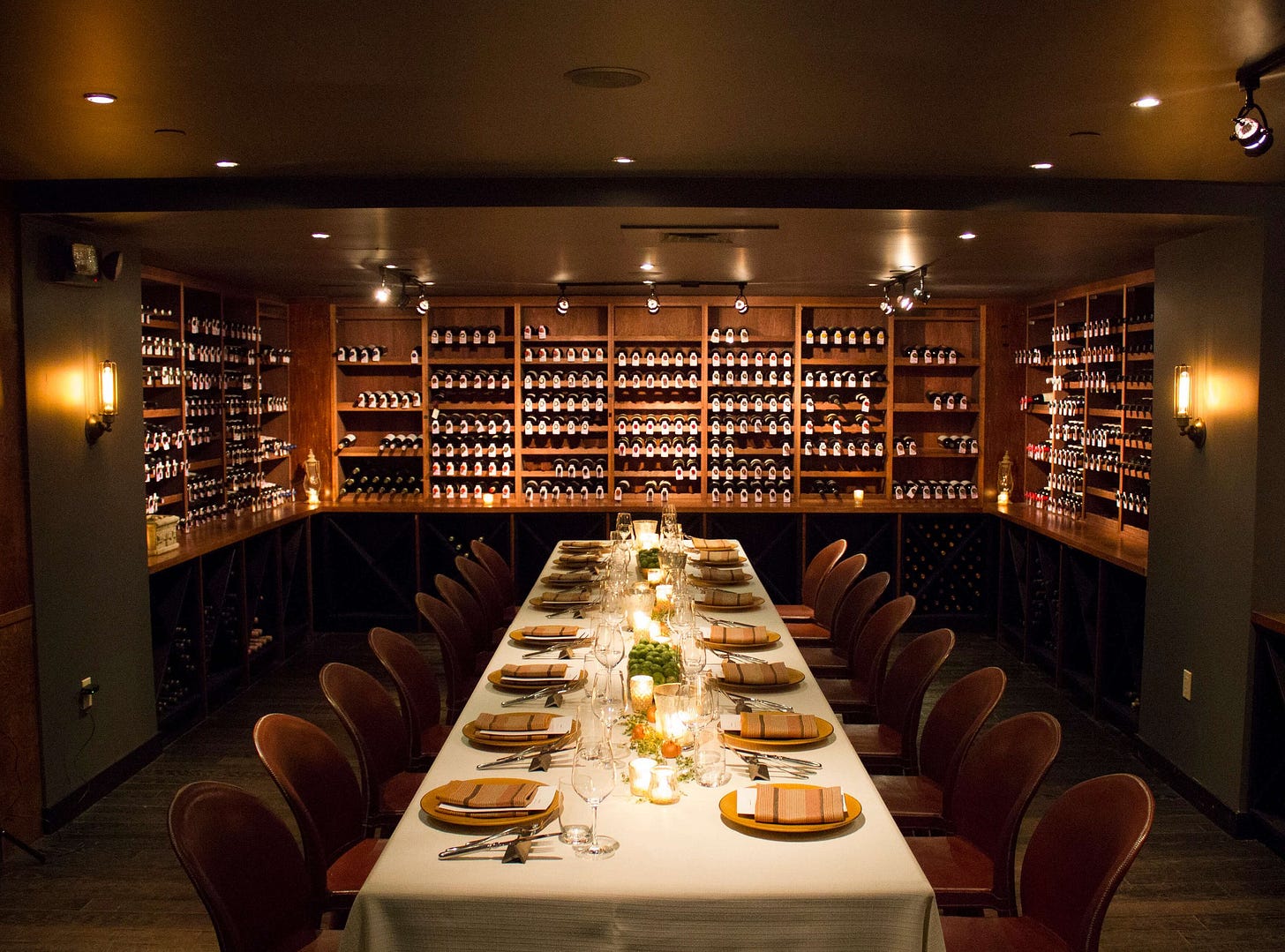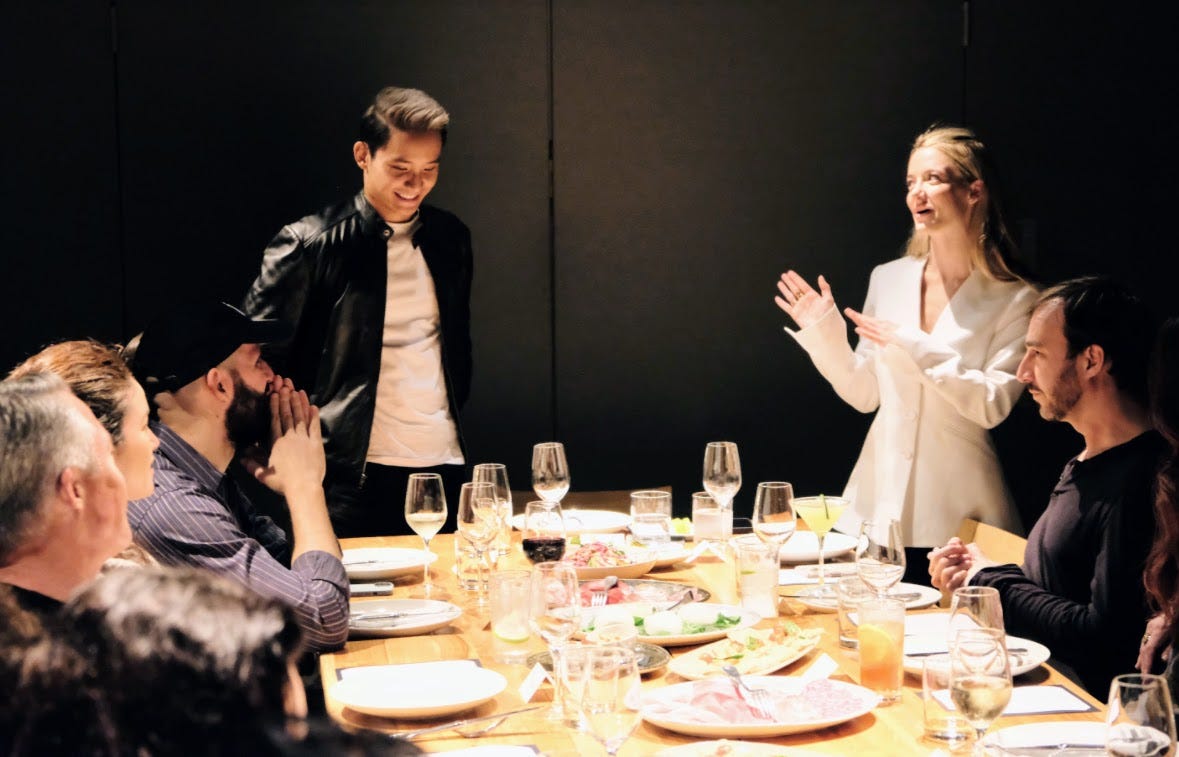How to Host an Industry Dinner
And make it worthwhile for both you and your guests.
Every time I send out this newsletter, I have a few dozen people reach out to me to ask for an introduction, a resource, advice, etc. I always try my best to help.
I started this newsletter to share advice and resources with the tech community in 2020, when many were looking for a tech job, and since then it’s grown by over 30,000+ readers. The community has expanded beyond tech job seekers to early-stage founders, institutional investors, digital creators,etc., and I want to continue to help by introducing you to someone, inviting you to an event, or sharing a resource.
But to do that, I need to know who you are and what you need help with.
So if you have 2 minutes, please fill this survey out. It’ll help me understand you better so that I can design experiences, create content, and build new things for you. There is only upside to filling it out!
Oh, and I’ve recently started a private community for entrepreneurs who are doing $500k to $5M USD in revenue a year. We help each other out with access, resources, and advice, have a group chat, and are kicking off events programming. If this is you, please fill this out.
In the past 3 years, I’ve hosted 100+ events for C-suite leaders, investors, and tech execs.
I’ve learned that hosting an industry dinner is an impactful way to build relationships, expand your circle, and give back to your community.
When done well, they can be extremely impactful to the people involved—all it takes is one good introduction to change the entire trajectory of someone’s life. But when done poorly, it is similar to the experience of being stuck on a bad, awkward date.
Industry dinners are formal affairs that require a significant amount of commitment from both the host and the guests, and today I’ll explain how you can make it worthwhile for everyone involved.
This guide assumes you already have a list of people to invite. If you don’t yet, I’ll share my thoughts on that in the next note.
Planning the Dinner
What’s the purpose? Is it social? Is it professional? Is it for dating? As we’re discussing industry dinners, my assumption here is that it’s professional.
Within the professional context, there are three specific purposes you’d target:
Purposeful Connection: to connect for a specific business purpose like fundraising, hiring, customer acquisition, etc.
Knowledge Sharing & Idea Exchange: to bring people together to exchange ideas, wisdom, and learning from their fields.
Exploration & Immersion: for attendees to immerse themselves in an environment where they are inspired, energized, and enlightened.
The dinner should serve one or more of these purposes.
Find a private venue. I prefer private, intimate spaces where you can control the volume and drive the conversation. You can opt for a private dining room at a restaurant or even a private residence. Prioritize a space that is quiet, accessible, intimate, visually appealing, and has a dining table that suits your setup.
(If you’d like a list of the breakfast and dinner venues I use in NYC just hit reply.)
Determine the size of the party. I recommend 8 to 16 people. If this is your first dinner, opt for 8. Dinner conversations tend to happen in clusters of 4, so stick to multiples of 4s. 4 to 6 is doable too, but it becomes less of an industry dinner and more of a casual meetup.
Who are you inviting? This ties back to the purpose of your dinner. I recommend explicitly picking a theme and defining your invitee criteria to suit your purpose. Dinners should be relevant to the guests. Ask yourself, “Why would I (the guest) want to come to this dinner?”.
Examples of themes:
Industry (e.g Series A health tech founders)
Topic (e.g. AI in the creator landscape)
Solving a problem (e.g. How to scale your teams with outsourced talent)
Profile or Experience (e.g. CTOs of $10M+/year companies)
It can also be any combination of the above.
Avoid too much contrast between the roles and experiences of the attendees. A CFO of a multi-billion-dollar company might not have anything relevant to talk about with a 21-year-old marketer at a CPG company.
There is the idea of a “matchmaking” dinner where you explicitly host dinners to connect two types of people on a professional level. For example, job seekers and hiring managers. Investors and founders. I’m not a fan. It makes the dinner conversation too transactional. It’s refined speed dating at its best.
Deciding who to invite is by far the most important part of the process.
Preparing for the Dinner
Set clear expectations. Send out an email 7 days before the dinner to confirm attendance, remind guests of the context of the dinner, share details on timing and location, and ask for dietary restrictions. Send another one 2 days before the dinner with a reminder of the previous email, include behavior expectations of the guests, and include an anonymized list of the guests who are attending (e.g. Chief Product Officer of $100M+/year consumer dating app company.)
Rule out flakes. My rule is that if someone flakes on my dinner at the last minute without a reasonable excuse, I will never invite them to another event. Set your boundaries.
Designate seating arrangements. The ideal setup for a group of 8 is a 3x1 table. For a group of 12 it’s a 5x1 and for a group of 16 it’s a 6x1. Intentionally assign everyone seats (with name tents) and place the highest-energy, most extroverted people in the middle of the table to start. Rotate the seating once or twice throughout the night.
Hosting the Dinner
Starting warm. Now the fun begins. I like to designate the first 15-20 minutes of the night for open socializing while standing up. Welcome your guests and invite them to have a beverage prior to being seated It’s ideal if your space accommodates this.
Introduce yourself. When the dinner starts, begin with introductory remarks. Explain the purpose of the dinner, why you’ve invited the specific folks in the room, what your expectations are of the guests, and how the evening will unfold. This should take no more than 3 minutes.
Introduce the guests. Then, go around the table and ask every guest to take 30 seconds to introduce themselves. This should take under 10 minutes.
Example:
Who are you?
What is going well for you? (Feel free to brag)
What could you use help with?
Begin the conversation. After introductions are made, empower the guests to start conversations. I sometimes print out “conversation starters” to help break the ice. Eventually, you will want to encourage guests to have discussions around the theme of the dinner. Pick 2-3 “big” questions or ideas that you want the guests to cover.
Ice-breakers:
What brings you to this dinner?
What are you excited about right now?
What is a niche hobby you enjoy doing?
What is the toughest thing you accomplished last year?
Who is the most fascinating person you’ve met and why?
What is a specific New Year’s resolution you have for 2024?
What is the craziest thing that happened to you in the last year?
After the Dinner
Paying for the dinner. I always pay for the dinners, and I typically do not charge guests. It is a worthwhile investment for me. But if you do, make those expectations clear ahead of time. In New York City, where I live, dinners can run me $100 to $250 per person with all costs factored in. Expect to pay at least $1,000 USD and up to $4,000 USD. You might want to consider getting sponsors involved too.
Make introductions. After the dinner, you may have guests come up to you and ask for specific introductions. Remember to always double-opt-in (ask both parties for permission) before you make the introduction.
Maintain guest privacy. Some guests prefer their names not to be mentioned or photographs not to be taken. This was always the case with high-profile entrepreneurs or executives (e.g. C-suite a $100B+ companies). Keep this in mind before you post about the dinner or share details about it.
I hope this helped!
If you are a business that is looking to get involved with these dinners and be in the room with C-suite leaders, decision-makers, founders, or investors, please fill this out. I have a few spots open.
And if you are an entrepreneur or founder who has raised >$3M or is doing >$500k in ARR and want to join a dinner, please reply to this email.
📌 Andrew’s Picks
Fascinating internet things I’ve come across.
10X Your Business – Two questions to ask yourself to reframe the way you think about building a massive company. If you’re an entrepreneur (venture-backed or not), take a few minutes to try this exercise by Elad Gil, notable investor and startup builder.
7 Strange Questions That Help You Find Your Life Purpose – If you’re stuck, unfulfilled, or perhaps working a 9-5 that you’re not passionate about, try this exercise. Mark Manso is a self-development author and proponent of stocism, his writing is slightly abrasive and vulgar, but there’s some good stuff there.
Build Personal Moats – Erik Torenburg’s (investor, co-founder of OnDeck, Turpentine) best career advice. You will always be the best in the world at being you. Figure out what you love, what you’re good at, what the world needs, and what you can be paid for to find out what that means.
🖼️ Behind the Scenes
Keep reading if you’re headed to Austin this year for SXSW…
I’m planning a series of programming and events over 5 days. It’ll be the coolest event I’ve done to date
(and the most $$$ I’ve invested in any individual project.)
Sign up here and I’ll promise to do 3 things for you:
Tell you about all the under-the-radar events happening around the conference
Invite you to join relevant group chats and communities to meet like-minded people attending.
Inform you about the private events that I’m hosting
See you there.







Great post Andrew! Do you have your sponsor attendees to these dinners? How do you think about that?